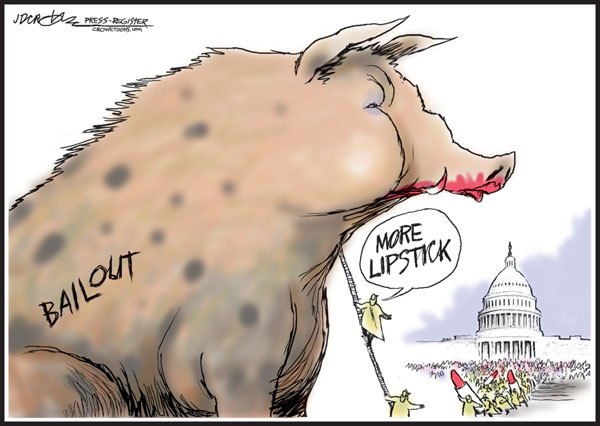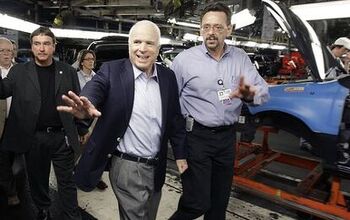Lipstick On A Bailout, 2.0

The U.S. jobless rate just rose to 9.1 percent. Employers added the fewest workers in eight months during May. The housing market is double-dipping. Only 16 month to go until the next presidential election. It’s the economy, stupid. The President has to do something. What does he do?
“President Obama’s visit to a Chrysler plant in Toledo, Ohio, on Friday was the culmination of a campaign to portray the auto bailouts as a brilliant success with no unpleasant side effects. “The industry is back on its feet,” the president said, “repaying its debt, gaining ground.”
If the government hadn’t stepped in and dictated the terms of the restructuring, the story goes, General Motors and Chrysler would have collapsed, and at least a million jobs would have been lost. The bailouts averted disaster, and they did so at remarkably little cost.”
He’s wrong, writes David Skeel, a professor of law at the University of Pennsylvania, in his op-ed piece in the Wall Street Journal.
“The problem with this happy story is that neither of its parts is accurate. Commandeering the bankruptcy process was not, as apologists for the bailouts claim, the only hope for GM and Chrysler. And the long-term costs of the bailouts will be enormous.”
David Skeel doesn’t buy the story that the bailouts were done at little cost. According to Whitehouse estimates, the bailout will cost the tax payer nearly $14 billion. And that’s a lie, says Skeel.
“But the $14 billion figure omits the cost of the previously accumulated tax losses GM can apply against future profits, thanks to a special post-bailout government gift. The ordinary rule is that these losses can only be preserved after bankruptcy if the company is restructured—not if it’s sold. By waiving this rule, the government saved GM at least $12 billion to $13 billion in future taxes, a large chunk of which (not all, because taxpayers also own GM stock) came straight out of taxpayers’ pockets.”
If you or I would take that tax loss under these circumstances, we’d go to jail. GM received a tax holiday for many years. But that’s not the worst of the bailout, says Skeel:
“The indirect costs may be the worst problem here. The car bailouts have sent the message that, if a politically important industry is in trouble, the government may step in, rearrange the existing creditors’ normal priorities, and dictate the result it wants. Lenders will be very hesitant to extend credit under these conditions.
This will make it much harder, and much more costly, for a company in a politically sensitive industry to borrow money when it is in trouble. As a result, the government will face even more pressure to step in with a bailout in the future. In effect, the government is crowding out the ordinary credit markets.”
It may not just make it harder to borrow when a company is in trouble. It may make it much harder to borrow, period. When the rule of law is set on its head, when senior debt is thrown by the wayside for political expediency, then investing in Russia suddenly looks like a safe investment.

Bertel Schmitt comes back to journalism after taking a 35 year break in advertising and marketing. He ran and owned advertising agencies in Duesseldorf, Germany, and New York City. Volkswagen A.G. was Bertel's most important corporate account. Schmitt's advertising and marketing career touched many corners of the industry with a special focus on automotive products and services. Since 2004, he lives in Japan and China with his wife <a href="http://www.tomokoandbertel.com"> Tomoko </a>. Bertel Schmitt is a founding board member of the <a href="http://www.offshoresuperseries.com"> Offshore Super Series </a>, an American offshore powerboat racing organization. He is co-owner of the racing team Typhoon.
More by Bertel Schmitt
Latest Car Reviews
Read moreLatest Product Reviews
Read moreRecent Comments
- Dave Holzman Golden2husky remember you from well over decade ago in these comments. If I wanted to have a screen name that reflected my canine companionship, I'd be BorderCollie as of about five years go. Life is definitely better with dogs.
- Dave Holzman You're right about that!
- EBFlex It will have exactly zero effect
- THX1136 What happened to the other companies that were going to build charging stations? Maybe I'm not remembering clearly OR maybe the money the government gave them hasn't been applied to building some at this point. Sincere question/no snark.
- VoGhost ChatGPT, Review the following article from Automotive News: and create an 800 word essay summarizing the content. Then re-write the essay from the perspective of an ExxonMobil public relations executive looking to encourage the use of petroleum. Ensure the essay has biases that reinforce the views of my audience of elderly white Trump-loving Americans with minimal education. Then write a headline for the essay that will anger this audience and encourage them to read the article and add their own thoughts in the comments. Then use the publish routine to publish the essay under “news blog” using Matt Posky listing the author to completely subvert the purpose of The Truth About Cars.


































Comments
Join the conversation
Whatever you folks end up deciding, just remember to stay away from MY dumpsters. If the IRS screws me for PAPERWORK reasons I am going to be an EXTREMELY disgruntled old coot.
The last three paragraphs sum it all up. One word: POLITICS. There is another aspect that I can't quite identify with any factual information at the moment is that it appears or appeared that the people responsible for the entire economic mess, whether in the financial world or in the automotive world in this country are somehow regarded as "golden eggs" that represent the fundamental cornerstones of stability, real or imagined, that must be protected at all costs. Hope that this makes sense in someone's universe, because I can't put my finger on any other reason that I've come across. If not this, then I give up trying to figure this whole thing out and just watch from the sidelines, too far away to render any assistance and just watch the whole thing go down the drain. What's done is done.